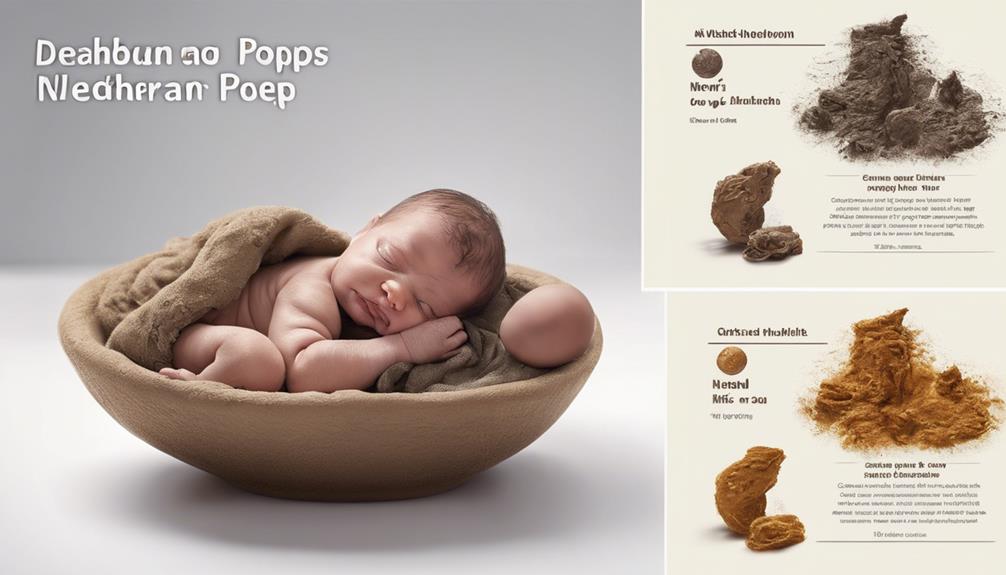As parents, we often liken a baby's poop schedule to a clock ticking—a reliable indicator of their well-being. Imagine, though, if that clock seemed to skip a beat.
The question arises: should newborns poop after every feeding? Let's explore this common parental concern, unpacking the significance behind infant stool consistency and frequency.
Understanding these nuances can provide reassurance and guidance as we navigate the intricate world of our little one's digestive system.
Key Takeaways
- Newborn poop frequency varies based on feeding type and digestion.
- Changes in poop colors can indicate gastrointestinal health.
- Consistency of newborn poop ranges from soft to seedy textures.
- Seek medical advice for unusual fussiness, weight loss, or feeding troubles.

Qunclay Reward Jar for Kids Pot Training Reward Jar Classroom Incentive Good Behavior Responsibility Chart for Christmas Boys Girls Gift(Fresh Style)
Fun Design: the wooden reward jar for kids adopts beautiful and stylish design, with cute and stylish star…
As an affiliate, we earn on qualifying purchases.
As an affiliate, we earn on qualifying purchases.
Newborn Poop Frequency
Newborns' poop frequency varies based on their feeding type and digestive system. Breastfed babies often poop after every feeding due to the gastrocolic reflex. This reflex is stimulated by the easily digestible nature of breast milk, leading to more frequent bowel movements. In contrast, formula-fed newborns may have fewer but larger bowel movements compared to their breastfed counterparts.
Understanding a newborn's poop patterns is crucial for parents to monitor their baby's health. It is normal for newborns to have different bowel movement frequencies, ranging from multiple times a day to once a week. While breastfed babies may poop after each feeding session, formula-fed babies tend to follow a more predictable pattern. Observing these variations can offer valuable insights into the baby's digestive system and overall well-being.

BabbleRoo Diaper Bag Backpack – Baby Essentials Travel Tote – Multi Function Water Resistant Diaper Bag, Travel Essentials Baby Bag with Changing Pad, Stroller Straps & Pacifier Case – Dark Gray
More than 2,000,000 bags sold! – Your Baby Registry search ends here with the perfect baby shower gift!…
As an affiliate, we earn on qualifying purchases.
As an affiliate, we earn on qualifying purchases.
Understanding Poop Colors

Understanding the colors of your baby's poop is essential for monitoring their health and wellbeing. In the early days, newborns pass meconium, which is a greenish-black stool and is perfectly normal.
As your baby moves to breast milk, their poop typically changes to a mustard-yellow color. On the other hand, formula-fed babies usually have poop that's yellow-tan resembling toothpaste.
It's important to pay attention to any deviations from these colors, as red or black poop may indicate gastrointestinal issues that require monitoring. Additionally, white poop in newborns can be a warning sign of liver disease or nutrient malabsorption.

Pedia-Lax Liquid Stool Softener for Kids, Ages 2-11, Berry Flavor, 4 Fl Oz
Gentle Constipation Relief: Softens stool to ease occasional constipation in children.
As an affiliate, we earn on qualifying purchases.
As an affiliate, we earn on qualifying purchases.
Consistency of Newborn Poop
As your baby's digestive system develops, noticing changes in the consistency of their poop can offer valuable insights into their health and well-being. Newborn poop can vary from soft and runny to seedy and mustard-like, with breastfed newborns often having more liquidy and seedy poop compared to formula-fed babies. Ensuring to pay attention to these variations as they can indicate digestive issues or reactions to food. Any hard, pellet-like poop in newborns may signal constipation, which requires medical attention to make sure the baby's comfort and health.
Seeing your baby's poop change consistency can be worrying, but it's a normal part of their development.
Remember, breastfed babies may have looser and more frequent stools, which is usually not a cause for concern.
If you notice sudden drastic changes in poop consistency, don't hesitate to consult your healthcare provider for guidance.
Understanding your baby's poop patterns can help you stay informed and proactive about their digestive health.

Similac 360 Total Care Infant Formula, Has 5 HMO Prebiotics, Our Closest Prebiotic Blend to Breast Milk, Non-GMO,‡ Baby Formula, Ready to Feed, 2-fl-oz Bottle, Pack of 12
Halal
As an affiliate, we earn on qualifying purchases.
As an affiliate, we earn on qualifying purchases.
Poop Patterns in Special Cases

In cases involving babies with special medical needs, it's important to pay close attention to their poop patterns for any potential indicators of health issues. Babies with conditions like NEC or bowel issues may experience altered poop patterns, deviating from the typical after-feeding schedule. Those with complex medical conditions or NICU babies might also have different poop schedules due to their unique health requirements.
Surgical interventions or treatments for bowel problems can further impact a baby's poop frequency, making it essential for parents to observe any changes carefully. Consulting healthcare providers is vital for guidance on understanding and addressing these altered poop patterns in babies with special medical needs. By staying vigilant and seeking professional advice, parents can make sure they're supporting their baby's unique health requirements effectively.
When to Seek Medical Advice
Seek medical advice if your newborn isn't pooping after every feeding and displays signs of discomfort or weight loss. It's important to trust your instincts as a parent and prioritize your baby's health. Here are some reasons to seek medical advice:
- Your newborn seems unusually fussy or in pain: Your baby's discomfort could be a sign of an underlying issue that needs medical attention.
- You notice a significant decrease in your newborn's weight: Weight loss in a newborn could indicate a feeding problem or an underlying health issue.
- Your newborn is having trouble feeding or seems lethargic: Difficulty feeding or lack of energy could be red flags that warrant medical evaluation.
- You feel anxious or concerned about your newborn's well-being: Your instincts as a parent are powerful; if you sense something is wrong, don't hesitate to reach out to a healthcare provider for guidance and support.
Frequently Asked Questions
Is It Normal for My Baby to Poop After Every Formula Feeding?
Yes, it's normal for formula-fed babies to poop after each feeding. Formula milk's composition affects digestion. It's healthy for them to poop regularly, showing proper nutrient absorption. Monitoring poop frequency helps track their overall health and digestion.
How Often Should a Newborn Poop Chart?
We observe newborn poop frequency to monitor their digestive health. It's typical for breastfed babies to poop after each feeding, while formula-fed newborns may go less often. Multiple dirty diapers a day are common in the early weeks.
When Should I Worry About My Baby Pooping Too Much?
If your baby is pooping excessively, consult your pediatrician. While frequent bowel movements are common in newborns, unusual patterns could indicate issues. Trust your instincts and seek professional guidance for peace of mind.
How Long Can Newborn Go Without Pooping?
I acknowledge your concern. Newborns can go several days without pooping, especially breastfed babies. 1-2 weeks without a bowel movement is normal for breastfed infants. Formula-fed babies may poop more frequently. Monitor closely and consult your pediatrician if needed.
Conclusion
As parents, we comprehend the uncertainty surrounding your newborn's poop patterns. Remember, every baby is unique, and their poop frequency can vary. Stay observant of colors, consistency, and patterns, but don't panic if things seem different. Trust your instincts, but always consult your pediatrician for guidance.
Your baby's health is our top priority, and together, we'll navigate this journey with knowledge and care. Keep an eye out for any changes and remember, we're here to support you every step of the way.









